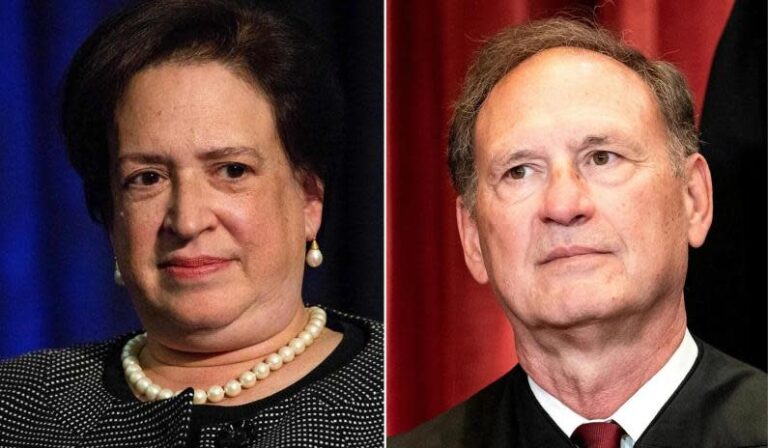
[ad_1]

Supreme Court justices have taken to publicly bickering over whether recent conservative majority decisions have undermined the credibility and reputation of the institution.
During an appearance last week at at Salve Regina University in Rhode Island, Justice Elena Kagan implied that the modern Court’s conservative majority was simply doing the partisan bidding of the Republican party, rather than adhering to a consistent judicial philosophy.
“The very worst moments have been times when judges have even essentially reflected one party’s or one ideology’s set of views in their legal decisions,” liberal Kagan said. “The thing that builds up reservoirs of public confidence is the court acting like a court and not acting like an extension of the political process.”
She also told a judicial conference in Big Sky, Mont. that it’s actually problematic for the court to be insulated from the political fray and popular impulses.
“If, over time, the court loses all connection with the public and with public sentiment, that is a dangerous thing for democracy,” she said.
Chief Justice Roberts in early September rejected his colleague’s logic, adding that the court’s mandate to interpret the law should be respected regardless of political fights over certain rulings.
“Simply because people disagree with an opinion is not a basis for questioning the legitimacy of the court,” he told a judicial conference in Colorado Springs, Colo. The Supreme Court’s responsibility “doesn’t change simply because people disagree with this opinion or that opinion or disagree with the particular mode of jurisprudence,” he said.
More recently, Justice Samuel Alito pushed back on Kagan’s attempts to discredit the Court in comments to the Wall Street Journal, though he stopped short of naming her directly.
“It goes without saying that everyone is free to express disagreement with our decisions and to criticize our reasoning as they see fit. But saying or implying that the court is becoming an illegitimate institution or questioning our integrity crosses an important line,” he said.
Recent polling shows a steep decline in public trust of the High Court. A Gallup poll conducted in June showed that just 25 percent of Americans report confidence in the institution, down from 36 percent in 2021. The drop in trust is largely driven by liberal dissatisfaction with a number of recent conservative victories in major cases, most notably Dobbs v. Jackson Women’s Health Organization, which overturned Roe v. Wade.
Other major conservative victories include Carson v. Makin, which struck down Maine’s exclusion of religious schools from a tuition assistance program, and New York State Rifle & Pistol Association v. Bruen, which struck down a New York concealed-carry restriction.
On the docket for the next Supreme Court term are other contentious cases, including 303 Creative LLC v. Elenis, which deals with a Christian graphic designer who refused to design websites that celebrated same-sex marriage because it violated her religious convictions.
More from National Review
[ad_2]